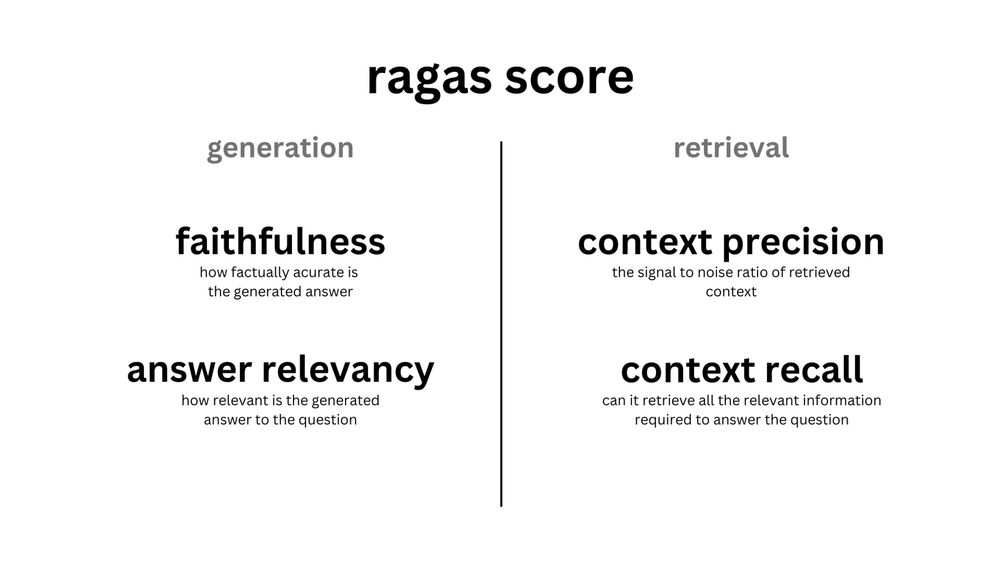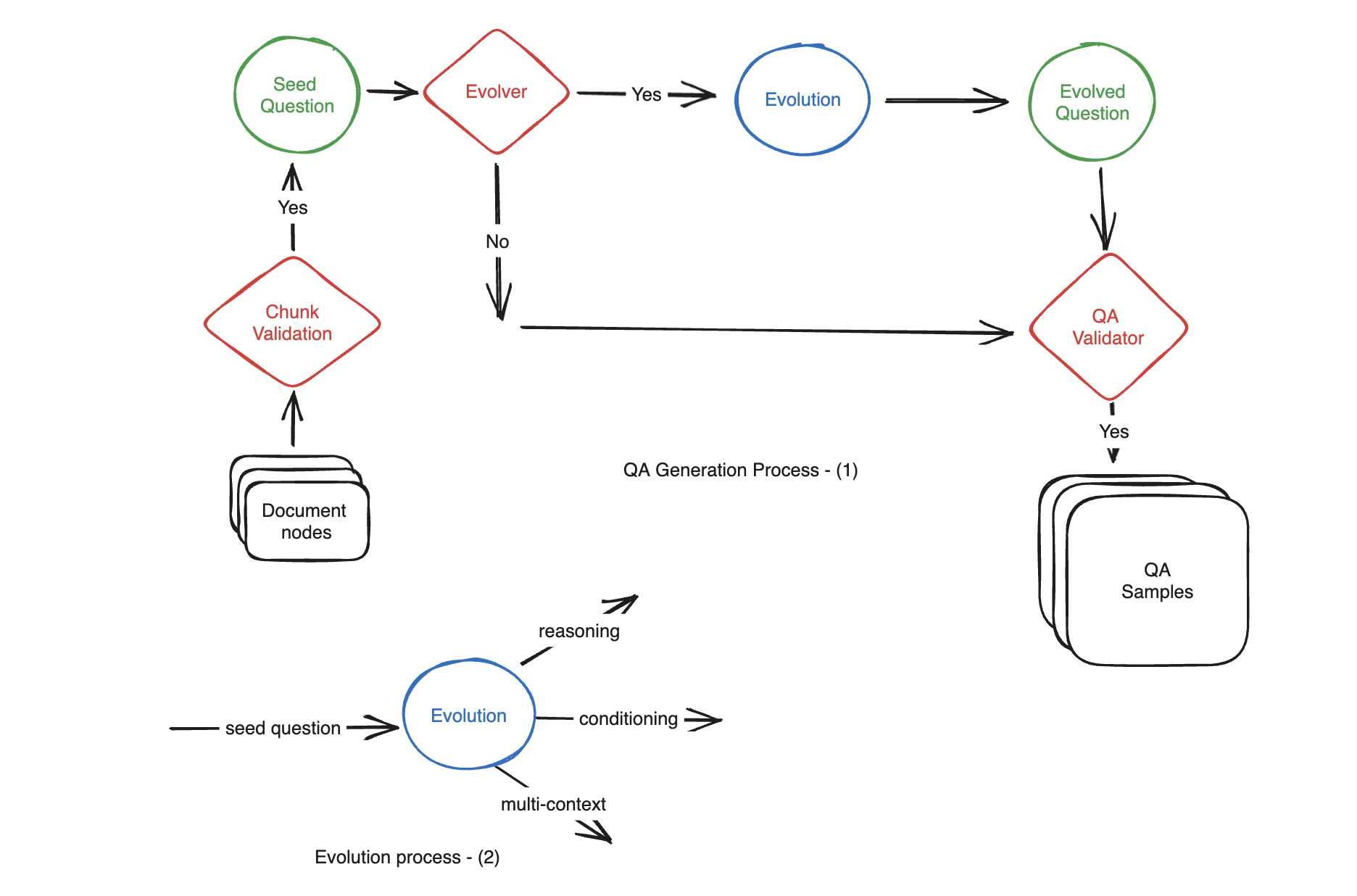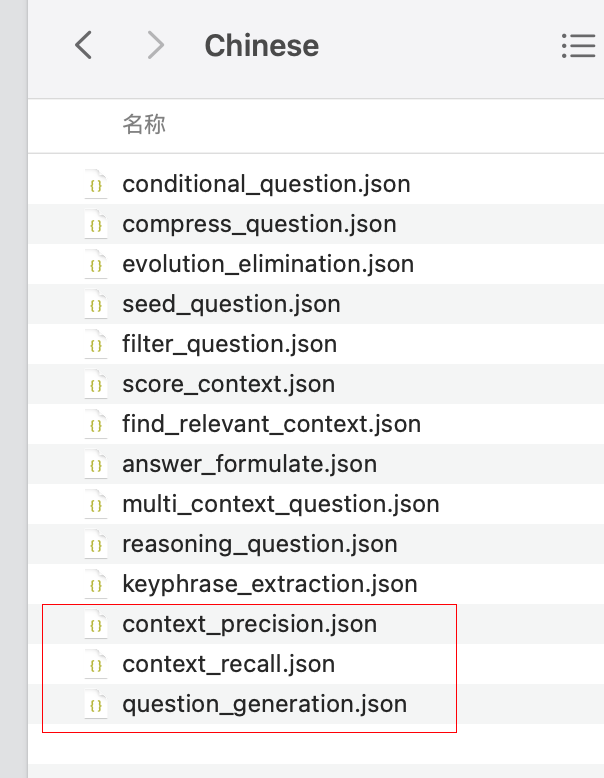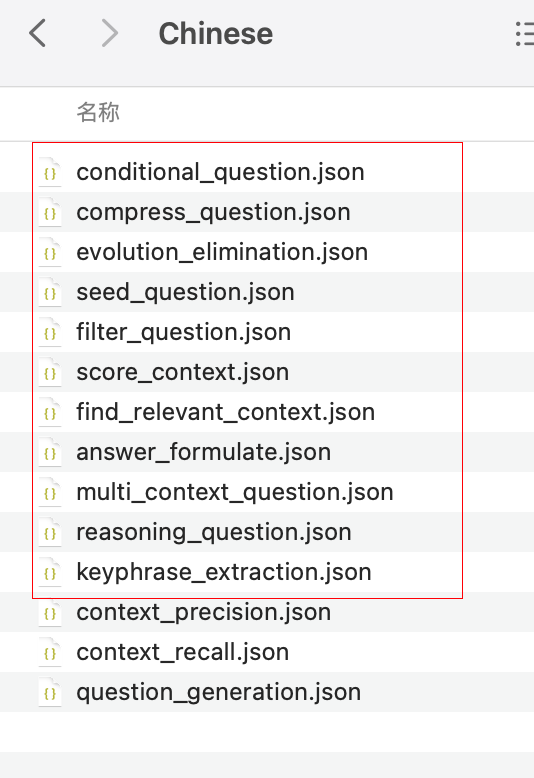Ragas
Quick Start
concept
| concept | implication |
|---|---|
| Question | |
| Contexts | Retrieved contexts: The actual found Context |
| Answer | The final generated answer |
| Ground truths | reference version |
Dataset
from datasets import Dataset
data_samples = {
'question': ['When was the first super bowl?', 'Who won the most super bowls?'],
'answer': ['The first superbowl was held on January 15, 1967', 'The most super bowls have been won by The New England Patriots'],
'contexts' : [['The Super Bowl....season since 1966,','replacing the NFL...in February.'],
['The Green Bay Packers...Green Bay, Wisconsin.','The Packers compete...Football Conference']],
'ground_truth': ['The first superbowl was held on January 15, 1967', 'The New England Patriots have won the Super Bowl a record six times']
}
dataset = Dataset.from_dict(data_samples)
Metric

| Metric | |||
|---|---|---|---|
| Context Precision | Retrieval | Question | Whether it is off topic: whether the search results are correlation on the Question |
| Answer Relevance | Anwser | Question | Off-topic: Is the generated answer correlation to the Question dependence |
| Faithfulness | Anwser | Retrieval | Reference or not: whether the generated answers are loyal to the search results |
| Context Recall | Retrieval | reference version Ground Truth | Accuracy of search: whether the search results are correlation on the reference answers |
Prompt
Context Precision
Given question, answer and context verify if the context was useful in arriving at the given answer. Give verdict as "1" if useful and "0" if not with json output.
The output should be a well-formatted JSON instance that conforms to the JSON schema below.
……
Your actual task:
question: 法国的首都是什么?
context: 巴黎是法国的首都。
answer: 巴黎
verification:
Answer Relevancy
I don't understand this Prompt
Generate a question for the given answer and Identify if answer is noncommittal. Give noncommittal as 1 if the answer is noncommittal and 0 if the answer is committal. A noncommittal answer is one that is evasive, vague, or ambiguous. For example, "I don't know" or "I'm not sure" are noncommittal answers
……
Your actual task:
answer: 巴黎
context: 巴黎是法国的首都。
output:
Faithfulness
Create one or more statements from each sentence in the given answer.
……
Your actual task:
question: 法国的首都是什么?
answer: 巴黎
statements:
Your task is to judge the faithfulness of a series of statements based on a given context. For each statement you must return verdict as 1 if the statement can be verified based on the context or 0 if the statement can not be verified based on the context.
……
Your actual task:
context: 巴黎是法国的首都。
statements: ["\u6cd5\u56fd\u7684\u9996\u90fd\u662f\u5df4\u9ece\u3002"]
answer:
Context Recall
Given a context, and an answer, analyze each sentence in the answer and classify if the sentence can be attributed to the given context or not. Use only "Yes" (1) or "No" (0) as a binary classification. Output json with reason.
……
Your actual task:
question: 法国的首都是什么?
context: 巴黎是法国的首都。
answer: 巴黎
classification:
Generate Synthetic Data
Motivation: Manually creating hundreds of QA (Question-Context-Answer) Sample from a Document can be time-consuming and laborious. UseLLM to generate automatically.
Solution:Evol-Instruct
Divided into several classes: simple,reasoning, conditioning, multi-context
These classes are called:evolutions

When generating the hour, specify the proportions of these three categories.
from ragas.testset.generator import TestsetGenerator
from ragas.testset.evolutions import simple, reasoning, multi_context
from langchain_openai import ChatOpenAI, OpenAIEmbeddings
# documents = load your documents
# generator with openai models
generator_llm = ChatOpenAI(model="gpt-3.5-turbo-16k")
critic_llm = ChatOpenAI(model="gpt-4")
embeddings = OpenAIEmbeddings()
generator = TestsetGenerator.from_langchain(
generator_llm,
critic_llm,
embeddings
)
# Change resulting question type distribution
distributions = {
simple: 0.5,
multi_context: 0.4,
reasoning: 0.1
}
# use generator.generate_with_llamaindex_docs if you use llama-index as document loader
testset = generator.generate_with_langchain_docs(documents, 10, distributions)
testset.to_pandas()
Read Data
Officially using LangChain, it is not easy to have problems if you continue to use LangChain.
Automatic language adaptation
assess
Translate the Prompt Fanyi used in the evaluation process into test, use the gpt-4-turbo-preview Model, and cache it locally.
The prompts belonging to respective metrics will be now automatically adapted to the target language.
The save step saves it to
.cacha/ragasby default to reuse later.
# Translate Prompt Fanyi in Metric into test
from datasets import Dataset
# from langchain.chat_models import ChatOpenAI
from langchain_openai import ChatOpenAI, OpenAI
from ragas.metrics import (
answer_relevancy,
faithfulness,
context_recall,
context_precision,
answer_correctness,
answer_similarity,
)
from ragas import evaluate
from ragas import adapt
eval_model = ChatOpenAI(model="gpt-3.5-turbo", temperature=0)
# llm used for adaptation
openai_model = ChatOpenAI(model_name="gpt-4-turbo-preview")
# openai_model = OpenAI(model_name="gpt-4-0125-preview", temperature=0)
adapt(
metrics=[
answer_relevancy,
# faithfulness,
context_recall,
context_precision,
answer_correctness,
# answer_similarity,
],
language="Chinese",
llm=openai_model,
)
# Eval
dataset = Dataset.from_dict(
{
"question": ["法国的首都是什么?"],
"contexts": [["巴黎是法国的首都。"]],
"answer": ["巴黎"],
"ground_truths": [["巴黎"]],
}
)
print(dataset)
results = evaluate(dataset, llm=eval_model)
print(results)
Generated Cache Data

Generate Synthetic Data
from ragas.testset.generator import TestsetGenerator
from ragas.testset.evolutions import simple, reasoning, multi_context,conditional
from langchain_openai import ChatOpenAI, OpenAIEmbeddings
# generator with openai models
generator_llm = ChatOpenAI(model="gpt-3.5-turbo-16k")
critic_llm = ChatOpenAI(model="gpt-4")
embeddings = OpenAIEmbeddings()
generator = TestsetGenerator.from_langchain(
generator_llm,
critic_llm,
embeddings
)
# adapt to language
language = "Chinese"
generator.adapt(language, evolutions=[simple, reasoning,conditional,multi_context])
generator.save(evolutions=[simple, reasoning, multi_context,conditional])
Generated Cache Data

Fields in the dataset
- question
- contexts: The retrieved Context
- ground_truth: reference answer
- anwser: Generated answer
- Question: A set of questions.
- Contexts: Retrieved contexts corresponding to each question. This is a
list[list]since each question can retrieve multiple text chunks. - Answer: Generated answer corresponding to each question.
- Ground truths: Ground truths corresponding to each question. This is a
strwhich corresponds to the expected answer for each question.
The reference context is not used yet
metrics=[
# 这几个都不需要原始的context
context_precision,
answer_relevancy,
faithfulness,
context_recall,
],
Using BGE
from ragas.llama_index import evaluate
flag_model = HuggingFaceEmbeddings(model_name="BAAI/bge-small-en-v1.5")
query_engine2 = build_query_engine(flag_model)
result = evaluate(query_engine2, metrics, test_questions, test_answers)
Ensemble LangSmith
Set Environment Variables
export LANGCHAIN_TRACING_V2=true
export LANGCHAIN_ENDPOINT=https://api.smith.langchain.com
export LANGCHAIN_API_KEY=<your-api-key>
export LANGCHAIN_PROJECT=<your-project> # if not specified, defaults to "default"
Create a tracker
# langsmith
from langchain.callbacks.tracers import LangChainTracer
tracer = LangChainTracer(project_name="callback-experiments")
Used when Evalue hour
from datasets import load_dataset
from ragas.metrics import context_precision
from ragas import evaluate
dataset = load_dataset("explodinggradients/amnesty_qa","english")
evaluate(dataset["train"],metrics=[context_precision],callbacks=[tracer])
Ensemble LlamaIndex
There is a problemwith the officialDocument.